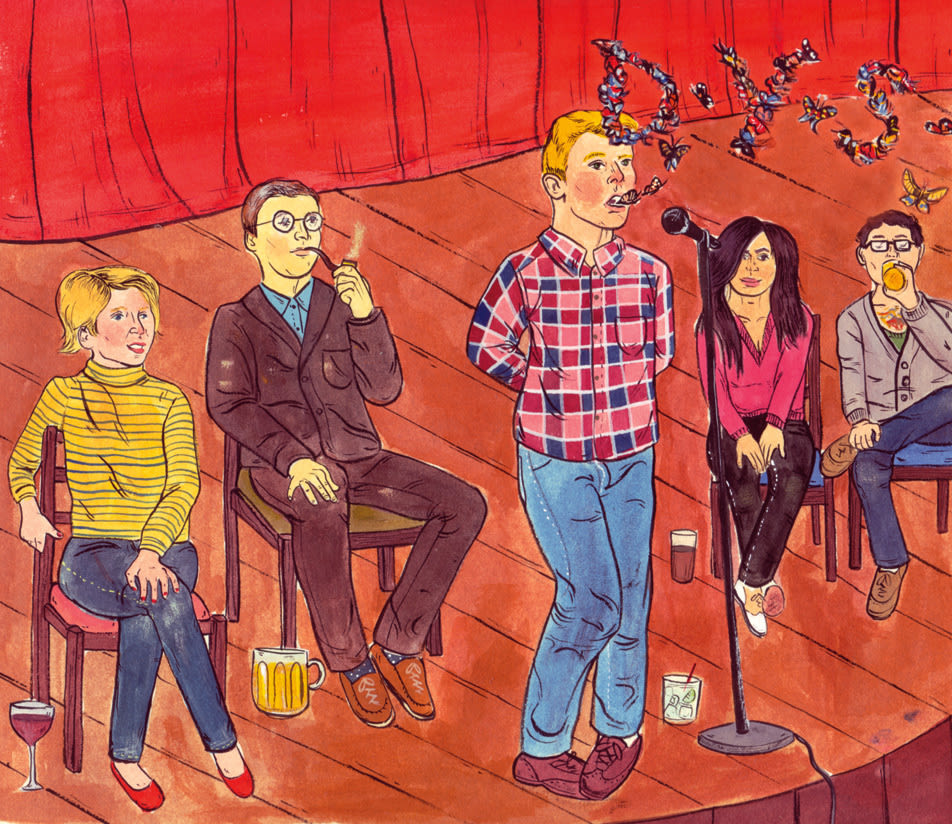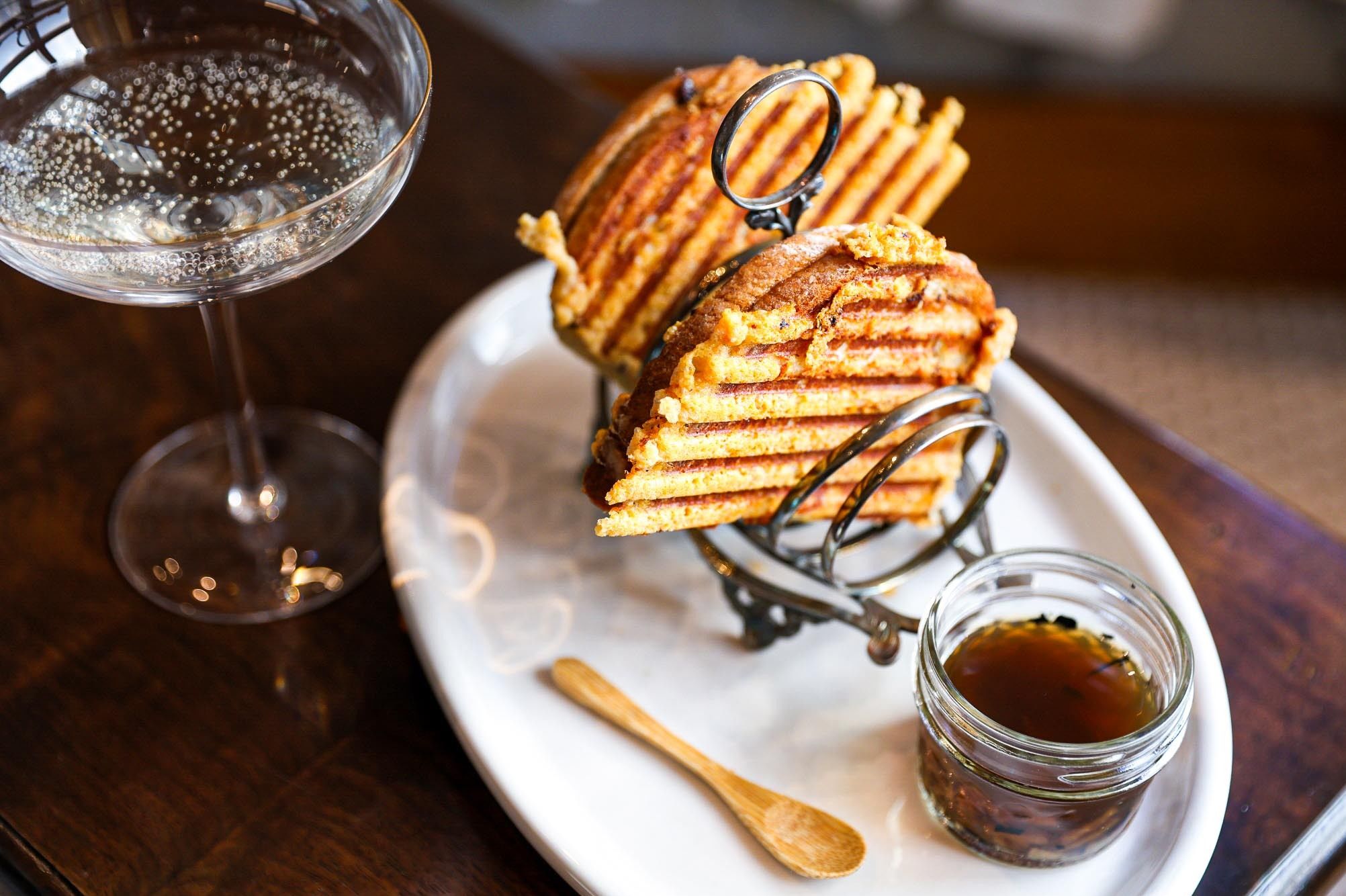To Bee or Not to Bee

Image: Kim Scafuro
The spotlights make it hard not to squint. Before my turn at the microphone, I fidgeted in my seat, crossing my legs and taking gulps of an amber ale. Now I’m standing at the edge of the stage, and there’s nothing to do but fold my arms and try to hide the fact that while others are here for fun, I’m here to exorcise a demon.
The audience quiets and the announcer says my word: kugel.
Kugel, I repeat, the first syllable exploding through the sound system like a cough. I’m fairly confident I know how to spell this word, but childhood scars never truly heal. This is a spelling bee, for God’s sake. Maybe the more manageable first-round words aren’t so easy after all. Am I absolutely positive about -el instead of -le? And how mortifying would it be to be absolutely positive and STILL be wrong?
I ask for the language of origin, just for the sake of doing it, but I’m too anxious to process the response. The same goes for an example sentence. (For the record: from Yiddish, a baked pudding served as a side dish or dessert.)
Kugel: k-u-g-e-l. Kugel.
That’s correct, says the announcer.
Two years ago, I set out to write a book about spelling. As a poor speller, I wanted to trace the roots of our wacky system for stringing letters into words. How exactly did our words come to look the way they do today? For centuries, scholars, editors, and other arbiters of culture have campaigned for reform of the English spelling code. What ever came of their efforts? Such influential people as Andrew Carnegie, President Theodore Roosevelt, and Noah Webster all pushed for an orthographic overhaul. To them, an event like a spelling bee wasn’t a charming American pastime; it was a quintessential illustration of how difficult the code could be, especially for those children who weren’t spelling savants—children like me.
At the same time, I needed to acquaint myself with the strange ritual that is the spelling bee. As a crappy speller, I had never been to one, and watching Spellbound doesn’t really count. During my year of research for the book, I occasionally attended the Monday-night spelling bee for adults at Mississippi Pizza Pub in North Portland. The organizer, Katherine “with a K” Woods-Eliot, pulls words from the same word lists used for the Scripps National Spelling Bee, but the atmosphere is substantially more relaxed: Participants bring their pints of microbrew onstage, there’s a generous intermission for refills, and no one seems to mind the occasional hint or mulligan. In other words, it’s a very Portland event, and I’d venture to say that adult spelling bees in Boston or New York City probably aren’t as chummy.
Yet the idea of participating still freaked me out. Every time I attended, my M.O. was to sit in the back and watch, telling myself that this was, if not valuable reporting, at least a good setting in which to mull over matters of etymology and orthography. Really, though, I was too nervous to sign up as a contestant. To legitimize my tab, I promised myself that once my book was completed, I would finally step up.
And so here I am. As no. 15 of 15 participants, I have the advantage of prior attrition as other spellers fall out of the running. Lupine, purloin, exigencies, hubristic, oligopsony, navicular. I make nervous jokes with the woman to my right, admiring her easygoing stage presence. She’s a short-haired hipster. When it’s her turn to spell, my imagination, overloaded with ideas about language trends and the Internet, gets the better of me. I imagine her lecturing us about creative spellings in text messages and e-mails, compared with the stuffier spelling rules that still permeate everything from letters to newspapers.
Why is it, I imagine her asking us the crowd, that we accept inventive spelling on Madison Avenue but not on high school term papers? Lite beer, rite aid, krispy kreme, citibank, sunkist, toys r us, qwest. Sure, they look odd without the capital letters and brand-associated fonts, but they’re just words—our words—spiced up on behalf of some multinational corporation. So when will t-h-r-u for through get the official OK from high school English teachers? After all, Google doesn’t even notice a difference between supersede and supercede. Fist in the air, the hipster lady says we need to reclaim our orthographic creativity. Then she gets the crowd chanting: Down with spelling neocons!
My next word is icebound, a lucky break except that it’s accompanied by resentful looks from previously eliminated contestants who drew harder words—so much for laid-back Portland. Icebound: i-c-e-b-o-u-n-d. Icebound.
I should be thrilled, but instead I feel like I’m rock climbing without a rope, ascending toward an even bigger—which is to say humiliating—fall.
The rounds continue. Kilderkin, meiobars, homuncular, dyscalculia. This last one grabs my attention, because I had spent some time looking into the relationship between spelling and dyslexia. (“Dyscalculia: from Latin and Greek, impairment of mathematical ability due to an organic condition of the brain.”) A slightly frenetic woman wearing a yellow Portland Spelling Bee Champion T-shirt mentions to the audience that she’s a grade-school science teacher. She sits down again, but in my mind she’s halfway into a sermon about how children nowadays are doing horribly in math and science, while every year the emphasis on (and pop-adoration of) spelling bees continues to intensify.
Scarifier, macrophagous, nephrolithotomy. My next word is odori, a type of Japanese dance. When I hear the word it occurs to me that I might actually win this thing. Because I lived in Japan for a few years, I happen to know that with Japanese words written out in English, what you hear is almost invariably what you get.
Odori: o-d-o-r-i. Odori.
With that, I’m now one of just five remaining contestants, including the overzealous former champion and two older gentlemen, one of whom sips a drink from a tumbler. The other is a confessed word maniac and former law professor from Salem.
In the bee taking place in my imagination, the professor speaks lucidly to the crowd. He is a word nerd to the nth degree, waxing on about language’s constant evolution. For centuries people have been whining about English’s descent into barbarity, he lectures, perpetually captivated by a fantasy of a more refined English of bygone eras. Like it or not, modern-day slang and txtng aren’t crushing the English of Chaucer or Shakespeare, the professor says. They’re merely the latest chapters in the centuries-old tradition of linguistic playfulness, a tradition that people like Chaucer and Shakespeare were very much a part of.
Although spelling changes don’t occur as rapidly as, say, neologisms, they are happening nonetheless. Hiccup was once spelled hiccough, subtle was once sutil, and maybe, just maybe, altho will someday replace although. It was the linguist Anthony Burgess who once said: “When we think we are making an objective judgment about language, we are often merely making a statement about our prejudices.” Our tastes about language may be immovable, but the language itself is not.
My final word is decuman. An adjective from Latin, it means “extremely large” or “immense,” usually in reference to a wave. The sample sentence: That decuman wave that took the ship fore and aft swept the life raft off the deck.
Decuman: d-e-c-u-m-e-n. Decuman.
Ding.
Consolation prize (a Tootsie Pop) in hand, I watch the professor triumph over the other three finalists, and in so doing earn a $20 gift certificate, a T-shirt, and bragging rights.
On my way home, I think about the time before Gutenberg and the printing press, before there were widely accepted spelling conventions. Back then, words were spelled any number of ways. Fish, fisc, fyshe, fissh, fisch, and so on. It wasn’t intentionally haphazard: The rule of thumb for scribes was to try and match each letter to a corresponding sound that would make the word readable to the target audience—kind of like an antiquated form of text messaging. Perhaps, I thought, my being a bad speller simply meant I was born a millennium too late. Which led me to ponder: When someone misspells a word in a spelling bee, does it really mean they’re failing the system, or is the system, in its rigidity, failing said speller? Does it really matter if an arcane word like decuman has a final e versus a final a?
Or maybe I’m just a poor loser. Thank God for spell-check.




